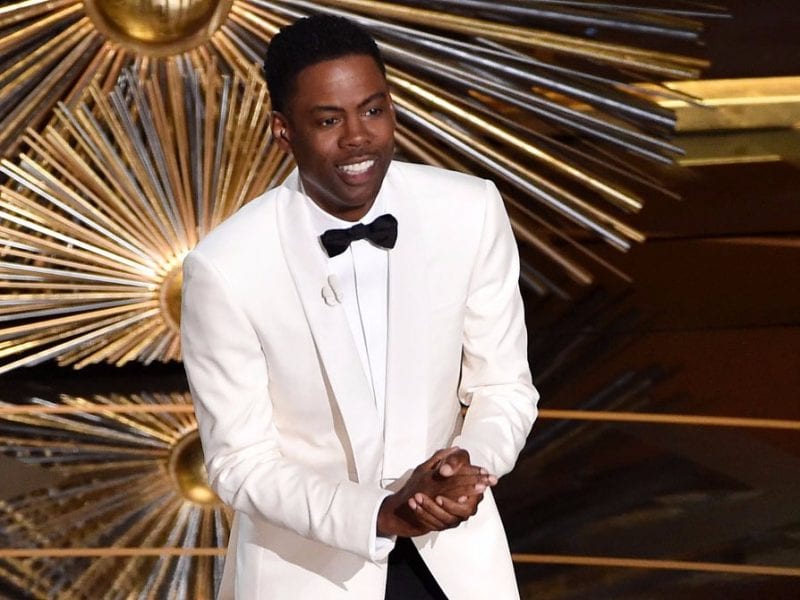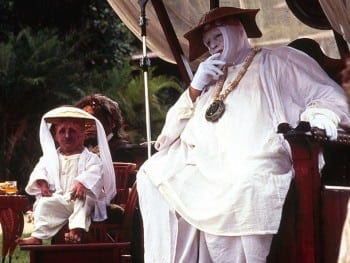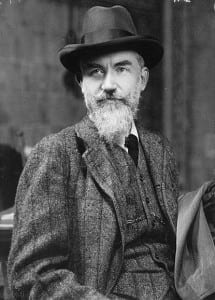
 A compilation of the best reviews by the best tv and cinema critics anywhere on the internet on films and programs of lasting cultural significance.
A compilation of the best reviews by the best tv and cinema critics anywhere on the internet on films and programs of lasting cultural significance.
“We gain our experiences of life in the form of catastrophe,” said Bertold Brecht in his discussion of the detective novel. Catastrophes give us insight into our society: its depressions, revolutions, and wars. Yet as we follow the unfolding narrative, Brecht goes on, “we sense that somebody must have done something to precipitate the catastrophe. So, who did what? The murder has taken place. What transpired beforehand? What situation resulted? Now, we might be able to work it out.”
Brecht’s observation applies equally well to Cold War spy stories such as Deutschland ’83 and The Americans. Reading detective — or spy — fiction can be likened to interpreting the catastrophes of our age.
Writing in the 1930s, Brecht didn’t have to search hard for catastrophes to decipher. Hunger and mass unemployment were followed by the high-tech inferno of modern war, with its Zyklon B, Operation Gomorrah, Fat Man, and Little Boy.
The postwar era saw capitalism’s destructive forces revved up further, but primarily as potential energy, so to speak, without kinetic release. Possible catastrophe lurks in the form of greenhouse gases — whose perverse quality is that they unleash catastrophe invisibly, gradually, primarily in the future, and through capricious feedback effects — and in nuclear warheads, awaiting orders in their silos.
Stephen Spielberg’s Bridge of Spies is set in the early 1960s, when the downing of Gary Powers’s U-2, the Bay of Pigs invasion, and the Berlin Crisis were fresh in the public’s mind. Another such moment was the early 1980s, when the European rollout of Cruise and Pershing missiles — mobile, highly accurate, and supersonic — threatened to give NATO first strike capability.

Western propaganda never stops trumpeting that GDR’s Stasi was ruthless, terrible and ubiquitous, but they conveniently forget to mention the contaminated context in which this nation existed, and the embarrassing fact the West installed, endorsed and supported scores of genuinely bloodthirsty regimes that really terrorized their populations, none of which could apply to life in the GDR. Such state of affairs continues to this day, despite the usual disclaimers.
This phase of the Cold War forms the historical backdrop to the television shows Deutschland ’83, directed by Edward Berger and Samira Radsi, and Joe Weisberg’s The Americans. The former opens where the latter closes, with Reagan’s 1983 “Evil Empire” speech to the National Association of Evangelicals in which he defended the siting of Cruise and Pershing missiles, which had begun that year, and prayed that “those who live in that totalitarian darkness will discover the joy of knowing God.”
The moral absolutism of Reagan’s prayer is the secret of Cold War nostalgia. George W. Bush invoked it when attempting to create an image of new enemies in the Middle East. The world during the Cold War was “dangerous,” he gibbered, “and you knew exactly who they were. It was us versus them, and it was clear who them was.”
It’s no surprise that the nostalgia aroused by Bridge of Spies is palatable to neocons. One reviewer reveled in its evocation of the “moral clarity” of the Cold War era, in particular that all forces of the US establishment — the FBI, the CIA, the judge, and Gary Powers — are portrayed “looking better than the communists.” Nostalgia is also for victory. “We won the Cold War,” the same reviewer gloats, and it’s “nice to see Hollywood get another piece of the story.”
The film’s imagined 1950s, after all, is a conservative’s wet dream. In the US, Stepford wives fawn over their hero husbands, and no black people cross the screen. In the Soviet bloc, state officials and soldiers are callous or duplicitous; torture is wantonly practiced; and all colors appear to have been expropriated from the screen, leaving the Soviets portrayed only in shades of grey.
Shades of grey are likewise absent in the politics of Bridge of Spies. It is liberal agitprop, reenacting the pivotal manoeuvre of Cold War liberalism: train the spotlight on one’s staunch and self-righteous support for liberal values while accommodating conservative forces and conjuring up humanitarian reasons for expanding Washington’s imperial clout.
The hero of Bridge of Spies, Irish-American lawyer James Donovan (played by Tom Hanks), talks the liberal talk but accepts that his country is run by security-paranoid conservatives. Although he tries to secure his goals — notably, to spare Soviet spy Rudolf Abel from execution — by following rational-universal legal rules, ultimately he can only achieve them through pandering to a conservative logic of “national security.”
At the heart of Bridge of Spies is a defense of constitutional patriotism. “What makes us both Americans?” asks Donovan of the German-extracted CIA agent Hoffman. The film’s emphatic answer: rules. The constitution. What Spielberg and his protagonist fail to see is that constitutional patriotism is the lifeblood of conservative anticommunism.
Only a few short years before Abel (played captivatingly by Mark Rylance) was brought to trial, constitutional patriotism had been recruited by President Truman and Senator McCarthy to justify anti-socialist witch-hunting and the suspension of the rule of law. Abel himself fell victim to this. He was secretly held in solitary confinement for seven weeks, without meaningful access to counsel. Although the movie’s makers emphasize that Bridge of Spies is based on a true story, this scene, unsurprisingly, didn’t make the cut.
The Bridge of Spies manifesto is that the United States is at heart a liberal nation. Read between the lines, however, and a different message can be discerned: Cold War liberalism supplied the ingredients from which neoconservatism was fashioned.
The Enemy Camp
[dropcap]N[/dropcap]either neoconservative nor liberal worldviews are conducive to classy spy drama. If the enemy is painted as godless, Reagan’s absolutism makes sense. But this leaves scant room for psychological drama or moral ambiguity.
Intelligent spy drama tends to thrive on realism rather than on liberal or neoconservative dogma. Realism, wary of universalism, zealotry, and crusades, morally relativist and ideologically flexible, came into its own during détente. In the face of economic and geopolitical uncertainty, particularly since the Iraq debacle, its fortunes have risen, making the 2010s a fitting moment for spy drama to revisit the Cold War.
For spy drama to spur critical reflection and go beyond mere “cinema of action” — in which the viewer continually pursues the superficial question “What will happen next?” — the story must force the viewer to instead ask “What am I seeing?”. In order to ask this question, people and states must be shown to the viewer in their full complexity.
Both Deutschland ’83 and The Americans attempt this. The critical conceit in both shows is that the central characters hail from, and are loyal to, the enemy camp — KGB agents, and an army officer turned Stasi spy, respectively — yet they are human, even admirable.
As a literary device this pays dividends. It enables The Americans to explore the grey zones between selflessness and manipulation in marriage, politics, and the workplace, portraying the conflicting allegiances, subterfuges, and betrayals in love and friendship across (and in analogy with) the Cold War divide.
In its boundary-pushing spin on the espionage genre, The Americans has deservedly won acclaim. But in its close-focus tracking of individual agents, it partakes in the spy genre’s characteristic depoliticization of international relations — presented as a game with stylized rules, conventions, and set pieces; hunter and hunted, all played out in a high-speed blur.
“It’s no surprise that the nostalgia aroused by Bridge of Spies is palatable to neocons. One reviewer reveled in its evocation of the “moral clarity” of the Cold War era, in particular that all forces of the US establishment — the FBI, the CIA, the judge, and Gary Powers — are portrayed ‘looking better than the communists.'”
Whereas The Americans sets up a loose analogy between personal and international relations, Deutschland ’83 presents characters as representatives of broad social forces. The principal social force is the East German (GDR) state, with a particular focus on the Stasi’s foreign intelligence wing.
The Stasi was an organization charged with gathering data on the cogs of the GDR state and economy, ensuring they continue to turn. The organization’s phalanxes of officers, bureaucrats, and goons infiltrated every aspect of East German life: vetting promotions to elite positions, sowing strife among dissident groups, and generating an air of paranoia in the interest of social control.
Less well known is that the Stasi also ran the foreign intelligence service, the Hauptverwaltung Aufklärung (HVA). If the Stasi had a glamor wing, this was it. Whereas most Stasi departments, presided over by the ogreish Erich Mielke, were dedicated to deploying massive state power to crush domestic dissent, the HVA slipped its agents into enemy territory where they had to live on their wits, risking a life behind bars if they took a wrong step. Spymaster-in-chief was the erudite, brilliant, and elusive Markus Wolf. In the GDR, if his name came up at all, it was in hushed tones — even after he had stepped down, for reasons obscure, in 1986.
The HVA planted sleepers in West Germany (the former FRG) with ease, exploiting the FRG’s assertion of political rights over the GDR, which accorded the right of FRG citizenship to all East Germans. But getting an agent close to West German generals in order to overhear what they and the Americans were planning was a trickier proposition.

Deutschland-83
This is the central plot line of Deutschland ’83. It follows a young border guard, Martin Rauch, whose loyalties are to the GDR, to his equally patriotic girlfriend Annett, and to his mother Ingrid. But Ingrid is suffering from kidney failure and in dire need of what East Germans called “Vitamin B” — from beziehungen meaning “connections” — in order to secure the transplant she urgently requires.
Ingrid’s sister Leonora, who works for the Stasi, knows this, and hears of the impending military aide appointment of a West German soldier, who bears a physical resemblance to Martin. The Stasi is looking for someone to infiltrate this post, and Leonora recommends Martin. He resists, despite promises by Leonora to exploit her connections to secure a kidney transplant for Ingrid. Ultimately she and her Stasi comrades — in a risibly implausible move — drug and kidnap him and whisk him off to work as a spy.
After this clunky opening, the plot is whipped along by the standard high voltage of the spy genre: nail-biting action sequences; the hero, tense and vigilant; agents never far away (in one hotel scene, half the workforce seems to be on spy duty for one power or other); and the arts and science of espionage — the gadgets and gizmos, codes and handovers, smoke and mirrors.
Two devices in Deutschland ’83 add piquancy and humor to the standard format. One is that serendipity — Martin’s resemblance to the West German aide — has decreed haste. Martin is catapulted untrained into position. In a sense, this is apprenticeship drama, but in which our novice hero’s slightest slip can blow his cover, endangering his own freedom and his mother’s life.
The other is that we see Western society as exotic, through “enemy” eyes. Thus, Martin’s undercover comrades must explain to him what a safe is: “capitalists like to buy things but are worried other people might steal them.” And they give him a Stasi-eyed take on the secret luxury of life in the West: “no one pays attention to you — here they call that freedom.”
Like The Americans, the psychological drama in Deutschland ’83 revolves around the protagonists’ double lives and how the two worlds they inhabit seep into one another or collide explosively. Both series are also about loyalty — the protagonists are internally divided between their “authentic” and professional roles. When characters must choose between allegiance to partner and family, or to career, cause, and state, loyalties are tested and falter.

Deutschland ’83 makes much of this potential. Matters of loyalty gain a sharp edge for Martin when he is instructed to seduce a NATO general’s personal assistant. If he falls in love, even a little, is it “authentic?” Should Annett forgive transgressions on grounds of patriotism? These scenes are perfectly plausible, given Markus Wolf’s notorious real-life reliance upon “Romeo” agents. The Stasi used the tactic against dissidents on the domestic front too, notoriously in the case of Vera Lengsfeld. (Its use against political activists by British undercover police has also attracted attention.)
Apart from the drama of divided loyalties, both shows also speak to ideology and the political present. A review of The Americans asked rhetorically: “When else have we seen ‘nice-looking fictional Marxist-Leninists’ portrayed with relative sympathy on American television?” There is something thrilling, it adds, “about watching Soviet agents outsmart the FBI every Wednesday night.”
One could quibble with aspects of this claim. For instance, the FBI is portrayed by The Americans much as their KGB counterparts: averagely decent people doing their job efficiently enough and only venturing off the legal piste when sorely provoked. Yet it does convey the gut appeal of the series to leftists.
Similar sentiments apply to Deutschland ’83, but the show goes further than The Americans in two respects. One is that its portrayal of East Germany is fine-toned and detailed.
One could cavil at its presentation of the GDR/Soviets as fighting dirtier than their Western rivals; the complicity of the Stasi with Carlos the Jackal is laid on too thick; and Soviet atrocities, rather than Western ones, tend to be highlighted. Yet on the whole the GDR comes across not as a totalitarian twilight zone but as a functioning country peopled (Stasi officers apart) by normal folk, whose state happened to have locked itself into an arms race that looks as absurd and inhuman from one side as from the other. The justifications trotted out on both sides follow the same mantra: “in the interests of national security.”
The portrayal of everyday East German life is achieved with accuracy and a certain lightness, highlighting, for instance, the popularity of naturism (when Annett and her second suitor, Thomas, get within ten meters of a lake all clothes are immediately off) and in the technology of the age (the response to a HVA officer’s bemused attitude to the personal computer: “but this, comrade, is the future!”). And even the Stasi officers and agents, though at times ruthless and Machiavellian, are no more so than, say, William Rawls (The Wire) or Frank Underwood (House of Cards).
Deutschland ’83 also goes further than The Americans in its depiction of the collision of social forces, of social movements, ideologies, and states, and the political and tactical divisions within each camp. Stasi officers clash over the evaluation of NATO troop movements and over the rise of the West German peace movement: some advocate assisting it; others worry that “the spark might jump over to our side and ignite a unified German movement.”
Among the West German peaceniks, debate roils as to whether to coordinate with their East German counterparts or to assume that Honecker, Mielke, Wolf and comrades are seeking a socialist-realist route to peace. US and FRG generals and politicians thrash out how to win nuclear war, if it indeed can be “won.” The German generals, on whose country nuclear bombs would fall, fear the fallout. Even the hawkish General Edel is uneasy: “God may have needed a week, but we’ll undo his work in a day.”
Meanwhile, West Germany’s generational Kulturkampf is condensed within General Edel’s own family: he, a choleric and authoritarian cold warrior versus his daughter (a hippie mystic) and his son (gay, rebellious, and raging at his father’s support for nuclear arms-wielding in pursuit of imperialist goals), leaving his wife to assume the futile role of domestic peacemaker (“This is a family, not geopolitical combat!”).
Yet despite its high-tension political clashes there is something exasperatingly bland about Deutschland ’83. This may reflect what one reviewer refers to as its soapesque qualities, but there is a politics to the dullness as well. As in The Americans, the “enemy hero” device is tame when the enemy is blond and has been comprehensively conquered. Deutschland ’83 is one thing; Pyongyang ’53, Vietnam ’73, or Mosul ’13 would be quite another.
Indeed, Deutschland ’83 exudes a cozy nostalgia for the Cold War and divided Germany — a time of excitement and fratricidal peril but which was (as we now know) en route to peace and reunited German normalcy. This nostalgia is fashioned through fastidious attention to period detail (the twin fears of nuclear Armageddon and AIDS; Martin’s elated discovery of the Walkman) and above all through the soundtrack.
The happy end delivers the fantasy of resolution. Wise heads prevail and bourgeois order is restored, with dramatic reconciliation mirroring geopolitical rapprochement. Just like the detective stories where the murder is always solved, in Deutschland ’83 the geopolitical tensions are overcome.
With all other contradictions effaced, we can reminisce upon the dark 1980s, an age of AIDS and nuclear saber-rattling but of blessedly averted catastrophe, untroubled by any hint of the dark side of German unification — for example the wage suppression imposed in the former GDR that was swiftly extended westward, enabling Germany’s unit labor-cost discrepancies to accumulate vis-à-vis weaker partners in the Euroland, a process that culminated in the Berlin-led sado-liberal evisceration of Greece as one moment within a renewed surge of empire building.
When Cold War–divided Germany becomes reclaimed for German-unified nostalgia, Deutschland ’83 loses its critical charge. The subliminal soothing message of Deutschland ’83 is that although life, and geopolitics, bring their hazards and perils, heroes of good will and stout heart, such as Comrade Rauch, will win the day.
In a sense this is classic spy drama, with its colliding social forces, moral uncertainties, and a degree of haziness as to who the good guys are. But with respect to the Brechtian deciphering of catastrophe mentioned above it doesn’t get much beyond political pulp fiction; it mainlines catharsis into anxious liberal veins.
The limitations of Bridge of Spies remind us of the substance to the claim that nowadays “if we want a critique of the culture, the only destination is TV.” But if so, The Americans and Deutschland ’83 fall short. Their apparent illumination of the murky undergrowth beneath the routine structures of high politics is appealing to be sure. They speak to the suspicion that behind the events that track across the newsfeed there are — as Brecht wrote of the detective genre — “other occurrences about which we are not told. These are the real occurrences. Only if we knew would we understand.”
It is a perception, Brecht adds, that speaks above all to intellectuals who “feel that they are objects and not subjects of history,” a situation of clue-sniffing angst that finds its ideal catharsis in the crime genre.
But the critical edge of The Americans and Deutschland ’83 is blunt in comparison to shows like The Wire, Breaking Bad, or the first season of House of Cards. Each in its own way, these dig deeper into the catastrophe of bourgeois order: the compulsive imperatives of economic and political competition, with its gross inequalities, megalomanic obsessions, and spawning of corruption and violence.
 Gareth Dale teaches politics at Brunel University. His books on East Germany are published by Routledge, Peter Lang, and Manchester University Press.
Gareth Dale teaches politics at Brunel University. His books on East Germany are published by Routledge, Peter Lang, and Manchester University Press.
Note to Commenters
Due to severe hacking attacks in the recent past that brought our site down for up to 11 days with considerable loss of circulation, we exercise extreme caution in the comments we publish, as the comment box has been one of the main arteries to inject malicious code. Because of that comments may not appear immediately, but rest assured that if you are a legitimate commenter your opinion will be published within 24 hours. If your comment fails to appear, and you wish to reach us directly, send us a mail at: editor@greanvillepost.com
We apologize for this inconvenience.


=SUBSCRIBE TODAY! NOTHING TO LOSE, EVERYTHING TO GAIN.=
free • safe • invaluable
If you appreciate our articles, do the right thing and let us know by subscribing. It’s free and it implies no obligation to you—ever. We just want to have a way to reach our most loyal readers on important occasions when their input is necessary. In return you get our email newsletter compiling the best of The Greanville Post several times a week.
[email-subscribers namefield=”YES” desc=”” group=”Public”]

Nauseated by the
vile corporate media?
Had enough of their lies, escapism,
omissions and relentless manipulation?
GET EVEN.
Send a donation to
The Greanville Post–or
SHARE OUR ARTICLES WIDELY!
But be sure to support YOUR media.
If you don’t, who will?
ALL CAPTIONS AND PULL-QUOTES BY THE EDITORS, NOT THE AUTHORS.


























